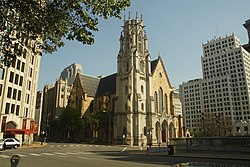Christ Church Cathedral (St. Louis, Missouri)
|
Christ Church Cathedral
|
|

Christ Church Cathedral
|
|
| Location | 1210 Locust Street St. Louis, Missouri |
|---|---|
| Coordinates | 38°37′49″N 90°11′55″W / 38.63028°N 90.19861°WCoordinates: 38°37′49″N 90°11′55″W / 38.63028°N 90.19861°W |
| Built | 1859 |
| Architect | Leopold Eidlitz; Legg, Jerome B. |
| Architectural style | Late Gothic Revival, Greek Revival |
| NRHP Reference # | 90000345 |
| Significant dates | |
| Added to NRHP | March 7, 1990 |
| Designated NHL | October 12, 1994 |
Christ Church Cathedral is the Episcopal cathedral for the Diocese of Missouri. It is located at 1210 Locust Street in St. Louis, Missouri. The Provost of the Cathedral is Kathie Adams-Shepherd. Built 1859-67, it is one of the few well-preserved surviving works of Leopold Eidlitz, a leading mid 19th-century American architect, and was designated a National Historic Landmark in 1994 for its architecture.
The cathedral is located in what is now downtown St. Louis, at the southeast corner of Thirteenth and Locust Streets. The main body of the church was built of Illinois sandstone, and its roof is of purple and green slate. It is basically a cruciform structure, with a tower projecting from the northern facade at the northwest corner. The base of the tower houses a baptistry, with a font of Italian marble.
A smaller sandstone chapel dates to 1893-95. From 1910-1912, a tower and porch were added of Indiana limestone.
The cathedral was built between 1859 and 1867, and designed by architect Leopold Eidlitz. The Gothic Revival structure was an expression of the city's sense of its significance as the United States expanded westwards. It was one of the earliest churches influenced by the revival within the Episcopal Church of early Christian practices and styles, which later was influenced by the Oxford Movement originating in England. It was designated a National Historic Landmark in 1994.
Montana silver magnate Charles D. McLure, a St. Louis native, was revealed to be the anonymous donor of $50,000 toward constructing the cathedral (approximately $6.5 million today).
...
Wikipedia



